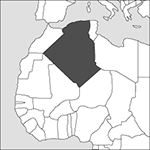
Capital:
Algiers
Area:
2,381,741 sq km (919,595 sq miles)
Population:
37,367,226 (2012 est)
Currency:
1 Algerian dinar = 100 centimes
Religions:
Sunni Muslim 99.0%
Ethnic Groups:
Arab and Berber 99.0%
Languages:
Arabic (official); Berber; French
International Organizations:
UN; Arab League; OAPEC; OPEC; Maghreb Union; Non‐Aligned Movement; AU
A country extending from the North African coast southward across a large part of the Sahara. Algeria’s narrow coastal strip is bounded by Morocco on the west and by Tunisia on the east.
Physical
The coast has an equable Mediterranean climate well suited to agriculture. Inland the ground rises until it is mountainous, though here also the valleys are fertile. Plains and plateaux provide grazing, while many of the mountain slopes are forested. South is the desert and further south‐east are more mountains with desolate plateaux and volcanic cones and craters.
Economy
Algerian industry, mainly state‐owned, is based on oil‐refining, but cement and steel are also produced. The country’s main exports are crude oil, petroleum products, and natural gas (which is now piped to Spain). Agriculture is limited: the northern mountainous region is suited only to grazing and timber, and the south of the country is the Sahara Desert. Algeria imports much of its food, the EU being the major trading partner.
History
The indigenous population of Algeria were Berbers, but the coast was colonized by the Phoenicians in the 9th century bc. In the 2nd century bc the Romans incorporated the whole region into the province of Africa. In the 7th century ad the Romanized Berbers resisted the Arab invasion fiercely. Once conquered they were converted to Islam, and became members of the extreme Kharijite sect. From the 11th century they were repeatedly ravaged by the Banu Hilal and other Arabs, and ruled by a series of dynasties until conquest by the Ottoman empire in the 16th century. Throughout the 18th century, Algeria was notorious as a base for pirates raiding Mediterranean shipping. Conquered by France in the 1830s (when its present boundaries were established) and formally annexed in 1842, Algeria was ‘attached’ to metropolitan France and heavily settled by European Christians. The refusal of the European settlers to grant equal rights to the native population led to increasing instability, and in 1954 a war of national independence broke out which was characterized by atrocities on both sides. In 1962, in spite of considerable resistance in both France and white Algeria, President de Gaulle negotiated an end to hostilities in the Evian Agreement, and Algeria was granted independence as the result of a referendum. In 1965 a coup established a left‐wing government under Colonel Houari Boumédienne and afterwards serious border disputes broke out with Tunisia, Morocco, and Mauritania. After Boumédienne’s death in 1978, his successor Chadli Bendjedid relaxed his repressive domestic policies and began to normalize Algeria’s external relations. Algeria was a one‐party state, ruled by the FLN (Front de Libération Nationale), from 1976 until 1989, when other political parties were legalized. The fundamentalist FIS (Front Islamique du Salut) party rapidly gained popular support. In 1992 the FIS seemed poised to win a general election but Bendjedid dissolved the government and resigned. A transitional military regime took over and cancelled the election. FIS supporters continued to wage a campaign of violence and terrorism; an estimated 76,000 people were killed in the years 1992–97. A new constitution was adopted in 1996, and in 1999 Abdelaziz Bouteflika was elected president. Disaffection by Islamists and Berber separatists has continued. Bouteflika was re‐elected in 2004 and announced plans for a general amnesty, which were subsequently backed in a referendum. He was again re-elected in 2009, after a change to the constitution allowed him to run for a third time. In 2011 Algeria saw demonstrations influenced by the Arab Spring; in response the government lifted the state of emergency that had been in force since 1992. Bouteflika was re-elected in 2014. The limit on presidential terms was reinstated in 2016, along with awarding the Berber language, known locally as Amazigh, official status.